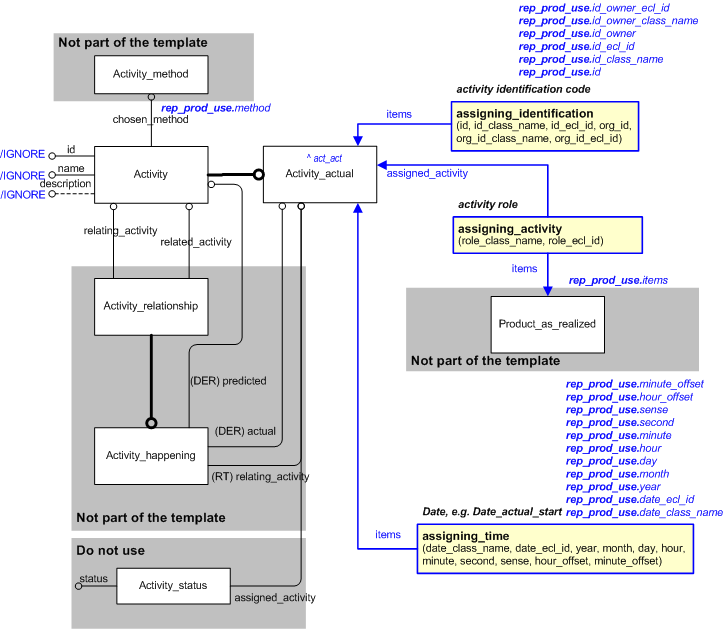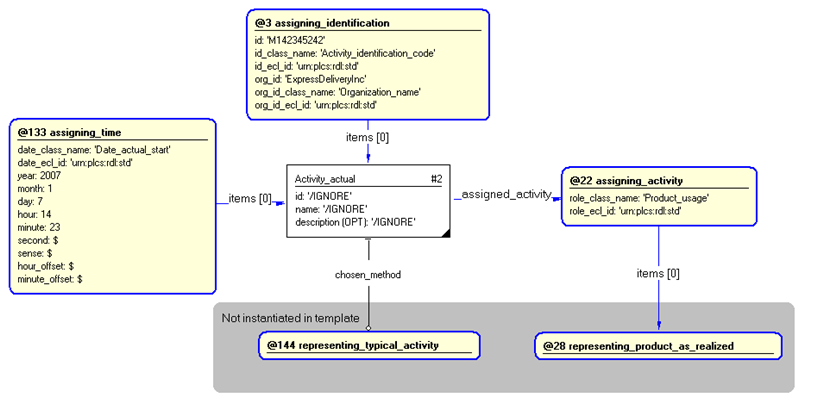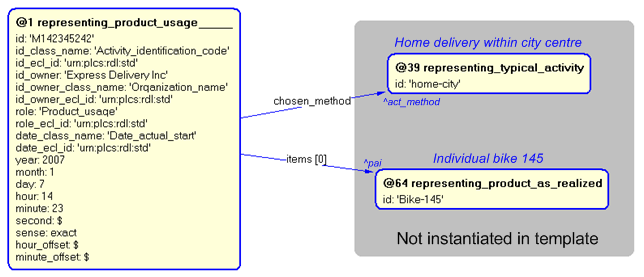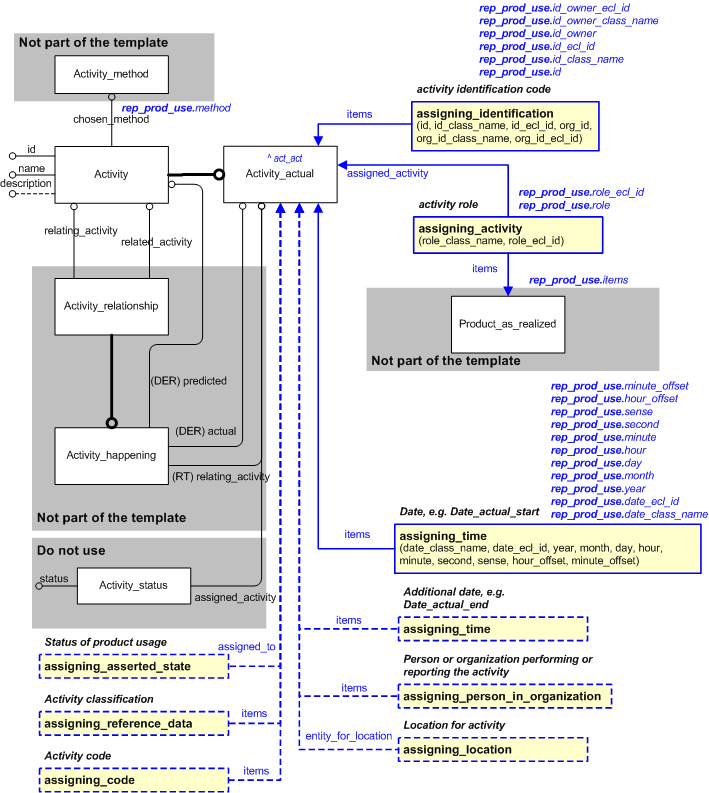| Template:— representing_product_usage (rep_prod_use) |
Date: 2008/01/18 08:58:19
Revision: 1.33
|
This section specifies the template representing_product_usage.
NOTE
An explanation of a template and the associated instantiation path is
provided in the
Template overview
section.
This template describes how to represent a record of the usage of a product, e.g. the use of an airplane
for a specific mission or the use of a truck for a specific transportation.
It represents an activity that has at least started and may have finished - an actual
activity.
It can be used to record any information about a product usage, such as what product individual
was used, who has reported the product usage, what typical activity was followed, and when
the product was used. It is
mandatory to assign an identifier or name to the activity, and a start or end time, and to relate
it to a typical activity (method) as well as the product being used.
Where the activity reported on is an authorized activity undertaken on a product in response to
a Work_order, such as
a change to the product, the template
representing_work_done should be
used.
Where the activity reported on is a neither an authorized activity, nor an activity
performed by a product
the more generic template representing_activity_actual
should be used.
NOTE
This template is intended for tracking product usage (operation).
Where the activity is work planned to be done on a product and authorised
by a Work_order, the template
representing_work_order
should be used.
Where the activity is planned to take place
some time in the future but is not authorized by a work order i.e. directed, the template
representing_planned_activity
should be used.
Where the activity is work that has been done to a product in response to
a planned activity (a Directed_activity) that has been authorized
by a Work_order, the template
representing_work_done
should be used.
Where the activity is a record of an activity that has taken place that is neither an authorized activity i.e. not authorized by
a Work_order such as part of a directed
change or technical bulletin, nor an activity performed by a product the
more generic template
representing_activity_actual should be used.
The EXPRESS-G diagram in
Figure
1
shows the templates and EXPRESS entities that are required
to represent the template
"representing_product_usage".
The text highlighted in blue shows the template parameters.
Grey areas and templates with dashed lines are not included in the template, but may be used to further
characterize the template.
Relations between the actual activity (product_usage) and a planned activity is instantiated through
Activity_happening.
Figure 1 — An EXPRESS-G representation of the Information model for representing_product_usage
The graphic for the template to be used in other EXPRESS-G diagrams
is shown in Figure
2
below.
Figure 2 — The graphical representation of the representing_product_usage template
The following input parameters are defined for this template:
The identifier of the Activity_actual.
id_class_name (Default=Activity_identification_code,Type='CLASS')
The name of the class being used to classify the identification
(
Identification_assignment)
of the actual activity. This provides the role or reason for the identification.
The following classes and their sub-classes can be used:
id_ecl_id (Default=urn:plcs:rdl:std,Type='URN')
The identifier of the
External_class_library
storing the definition of the class referenced by the parameter @id_class_name class.
The name or identifier of the organization owning the identifier or name.
The name of the class being used to classify the
identification of the organization. For example CAGE code, or organization name.
The following classes and their sub-classes can be used:
The typical activity of which this activity_actual is an instance,
or other regulating method.
role (Default=Product_usage,Type='CLASS', Optional)
The class name of the
External_class
corresponding to the role of the activity assignment.
The following classes and their sub-classes can be used:
role_ecl_id (Default=urn:plcs:rdl:std,Type='URN', Optional)
The identifier of the
External_class_library
storing the definition of the class referenced by the parameter
@role_class_name.
The product that is or was used in the activity, e.g. the airplane that was used
for a specific mission, the truck that was used for a specific transport.
The name of the class being used to classify the date or time. Must be either a start or an end date or time.
The following classes and their sub-classes can be used:
The year component of the date and time the activity was started or completed.
The month component of the date and time the activity was started or completed.
The day component of the date and time the activity was started or completed.
The hour component of the date and time the activity was started or completed.
The minute component of the date and time the activity was started or completed.
This parameter is optional. If not given, it will remain unset.
The second component of the date and time the activity was started or completed.
This parameter is optional. If not given, it will remain unset.
The direction that the time the activity was started or completed is offset from Coordinated Universal
Time.
Enumeration values are: 'ahead', 'exact' or 'behind'.
The number of hours by which the time the activity was started or completed is offset from Coordinated Universal
Time.
The number of minutes by which the time the activity was started or completed is offset from Coordinated Universal
Time.
The value of this attribute need not be specified.
This parameter is optional. If not given, it will remain unset.
The following reference parameters are defined for this template:
Allow the
Activity_actual
entity instantiated in this path to be referenced when this template is used.
%^target = $representing_product_usage.act_act%
Allows referencing of entity Activity_actual from outside the template, e.g.
in order to characterize the Activity_actual further.
The following parameter combinations specify a uniqueness constraint:
Unique constraint: Unique activity actual
The instantiation path shown below specifies the entities that are to be
instantiated by the template.
-- instantiate Activity_actual Activity_actual%^act_act =
Activity_actual%
^act_act.id = '/IGNORE'
^act_act.name = '/IGNORE'
^act_act.description = '/IGNORE'
^act_act.chosen_method ->
@method-- assign ID to activity_actual /
assigning_identification(
id=@id,
id_class_name=@id_class_name,
id_ecl_id=@id_ecl_id,
org_id=@id_owner,
org_id_class_name=@id_owner_class_name,
org_id_ecl_id=@id_owner_ecl_id,
items=^act_act)/
-- assigning activity_actual to the corresponding product in a specific role /
assigning_activity(
role_class_name=@role,
role_ecl_id=@role_ecl_id,
assigned_activity= ^act_act,
items=@items)/
-- assigning an actual date of the activity_actual /
assigning_time(
date_class_name=@date_class_name,
date_ecl_id=@date_ecl_id,
year=@year,
month=@month,
day=@day,
hour=@hour,
minute=@minute,
second=@second,
sense=@sense,
hour_offset=@hour_offset,
minute_offset=@minute_offset,
items= ^act_act)/
The following entities are instantiated with attributes as specified:
The instance diagram in Figure
3
shows an example of the EXPRESS entities and templates that are instantiated by the template:
/representing_product_usage(id='M142345242', id_class_name='Activity_identification_code', id_ecl_id='urn:plcs:rdl:std', id_owner='ExpressDeliveryInc', id_owner_class_name='Organization_name', id_owner_ecl_id='urn:plcs:rdl:std', items='#65', method='#40', date_class_name='Date_actual_start', date_ecl_id='urn:plcs:rdl:std', year='2007', month='01', day='07', hour='14', minute='23', second='', sense='', hour_offset='', minute_offset='', role='Product_usage', role_ecl_id='urn:plcs:rdl:std')/
(an illustration of the consolidated representing_product_usage template is shown in
Figure
4 below.)
Figure 3 — Entities instantiated by representing_product_usage template
The instance diagram in
Figure
4
shows the graphic symbol for the template that is to be
used in other instance diagrams. The example template is:
/representing_product_usage(id='M142345242', id_class_name='Activity_identification_code', id_ecl_id='urn:plcs:rdl:std', id_owner='ExpressDeliveryInc', id_owner_class_name='Organization_name', id_owner_ecl_id='urn:plcs:rdl:std', items='#65', method='#40', date_class_name='Date_actual_start', date_ecl_id='urn:plcs:rdl:std', year='2007', month='01', day='07', hour='14', minute='23', second='', sense='', hour_offset='', minute_offset='', role='Product_usage', role_ecl_id='urn:plcs:rdl:std')/
Figure 4 — Instantiation of representing_product_usage template
The following section details how the
representing_product_usage
template can be optionally characterized by assigning
other constructs to it. These are characterizations commonly
applied to the template. The ISO 10303-239 EXPRESS model may enable
other assignments to the entities instantiated by the template.
The EXPRESS-G diagram in Figure
5
shows the possible characterizations of the template
"representing_product_usage".
Figure 5 — Characterizations for representing_product_usage template
The following characterizations may apply:
Characterization Assigning classification or code
NOTE this characterization is optional.
Characterization Assigning organization or person in organization
NOTE this characterization is optional.
Characterization Assigning state
NOTE this characterization is optional.
Characterization Assigning location
NOTE this characterization is optional.
A location can be associated to the actual activity
by using the template
assigning_location.
See
Figure 5
for an Express-G overview.
The location may be expressed as a global location, an address-based location, an organization-based location,
or as a location in a regional grid. See further Capability C049: assigning_location (NB Capabilities are not documented in this release of the PLCS standard)
.
The assignment of the location
(assigning_location)
may be classified e.g. as 'Actual_start_location' or 'Actual_maintenance_location'.





